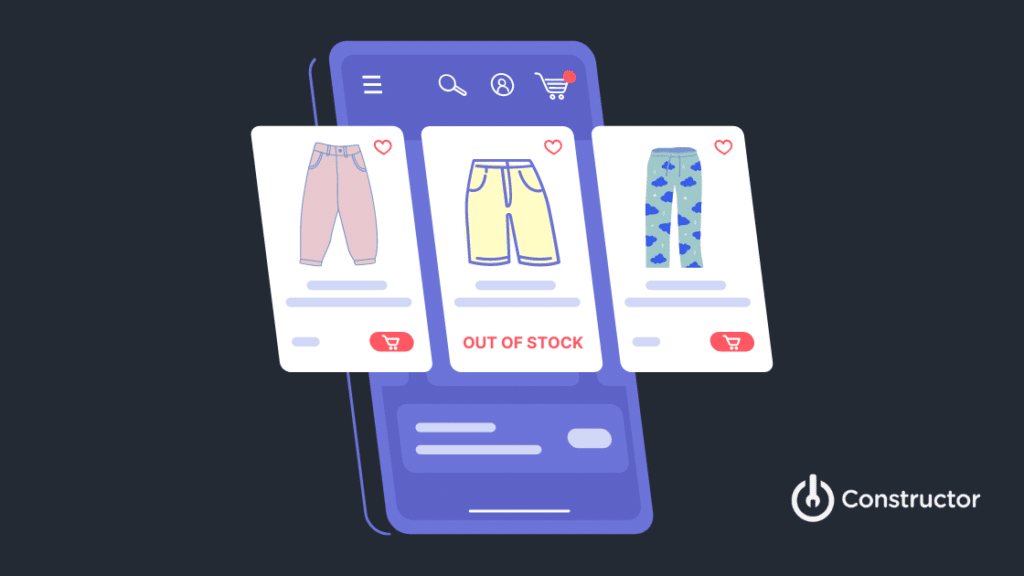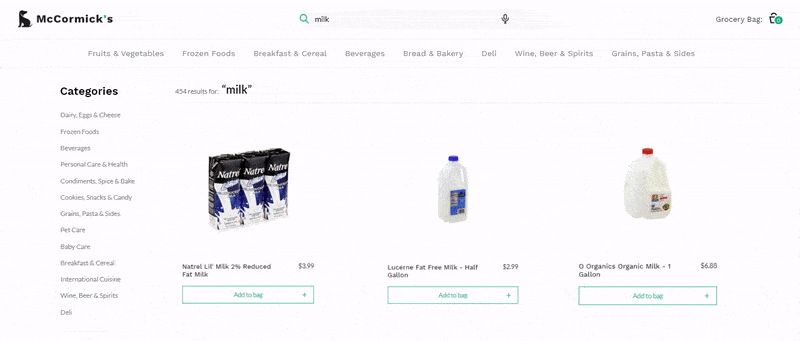Up to 60% of online shoppers agree that it’s important for retailers to offer advanced site search, according to Forrester Research. It’s no wonder that people working on and evaluating search engines for ecommerce sites have strived for years to optimize for search relevance.
The problem: relevance leaves a lot of money on the table when it comes to ecommerce results.
Companies like Google and Amazon tackle search differently. They’ve succeeded in part because they’ve designed their search engines to fuel critical business metrics like revenue, conversion rate, and profit. As a result, they outpace older site search engines at every turn.
Why? Because they know that search engines based on relevance aren’t the right search engines for ecommerce.
Why Search Relevance Alone Doesn’t Work for Ecommerce
The vast majority of search companies aren’t dedicated to ecommerce use cases. They’re one-size-fits-all solutions, and it doesn’t take too much digging to find out why that’s a problem for commerce sites.
These companies are based on keyword engines like Solr or Elasticsearch, which rely on keyword matching algorithms to return results, determine “search relevance” based on the number of times the keyword appears, and break ties when they occur.
For content, this makes perfect sense. You’d expect an article about giraffes to mention the keyword “giraffes” quite a bit. So, the logic goes, the same principles apply for ecommerce. The more a keyword appears in the text, the more relevant the text must be for any search query containing that term, right?
Wrong.
In ecommerce, just because a product is relevant doesn’t mean it’s attractive and will lead to a purchase.
Say you visit a mens’ apparel site and search for “pants.” A large percentage of the product catalog is likely to be returned; this mens’ retailer sells a lot of pants. But what about pants that are out of stock, or pants that are out of style, or pants that get only lukewarm reviews? Those pants are relevant—they’re pants. But they’re not what you’re looking for.

That’s the limitation of relying on relevance alone.
Older search engines often compensate for these poor results by layering AI solutions on top to re-rank the products: changing the order that they appear based on popularity, or determining how to weight product page description keywords in relation to title keywords.
Re-ranking bad results creates a number of new problems:
- Slower search. Working with two systems overcomplicates and slows down the retrieval process, potentially impacting the customer experience.
- No optimization for ecommerce goals. Keyword engines don’t return non-matching items that might actually be more attractive to the shopper or increase the chances of a purchase or upsell, like cream cheese to pair with bagels.
- Lack of innovation and agility. 59% of customers now say personalized shopping experiences are critical, but older keyword engines restrain search providers from innovating on new offerings like personalization.
- More manual work for ecommerce teams. The problems above are passed on to merchandisers, who have to create synonyms and boost and bury products to compensate for poor results.
Ultimately, a retailer’s search results can be both perfectly relevant and incredibly unhelpful to users’ buying journeys and the retailer’s reputation.
So what do leading retailers optimize for instead?
Optimize for Ecommerce Business Metrics
It’s important to remember that search relevance is, at best, a means to an end for ecommerce retailers: business KPIs like revenue, profit, and conversion rate. Many of these metrics simply don’t exist in content search, and so older search engines aren’t designed to optimize for them.
What happens when you show each individual customer products for each search in the order that will most likely lead to an increase in the business metric? Great things, it turns out.
In order to deliver these kinds of results, any ecommerce search solution worth its salt must meet these three criteria:
- An engine built on machine learning, not retrofitted for it
- A dedicated focus on specific ecommerce needs
- A holistic customer experience ecosystem
AI-first technology’s advantage over “search relevance”
When you build a search engine on just keyword matching, trying to layer machine learning on top doesn’t fix the underlying problem. It’s like trying to turn a 1996 Volkswagen Golf into a Tesla.
But when you take the time to invest in the right solution from the beginning—a search engine that actually learns from collective and individual human behaviors—the technology can consistently evolve to meet market needs; provide better search, browse, and recommendations results; and drive ecommerce outcomes.
Machine learning presents a number of ways to learn and surface products that aren’t just relevant but attractive to individual customers. If a user tends to buy Apple products, their query for “laptop” will likely show them MacBooks first. If a user tends to buy a lot of video games, they might see premium gaming laptops at the top of the search results page.

Learning from how humans actually use language and what each user goes on to add to cart and purchase ensures that the products that are most likely to sell appear at the top of the page.
This strategy goes far beyond search relevance, and the level of machine learning it requires simply isn’t possible with text-based matching platforms—no matter how many workarounds and additional layers vendors pile on top.
The second reason is next.
Your ecommerce search solution must be tailored for ecommerce
It sounds obvious, but it’s not: ecommerce search performs better when it’s driven by technology that’s built for ecommerce.
If you need a new tire for your Tesla, which will perform better: a tire designed for a Tesla, or an all-purpose tire that could also work on a bicycle or a tractor?
This principle applies in all sorts of contexts. Maybe there are different KPIs you’d like to optimize for at different times (sell-through rate at end of season to balance inventory, for example, or profit margin near the end of the fiscal year). This will impact your ranking strategy.
Say that a visitor to your site searches for a really nice TV that they can’t really afford. They add it to the cart, and your search vendor considers that action a “conversion”… but then the customer exits the store and abandons the item in their cart, when you could have convinced them to buy a different TV right now.
These are specific ecommerce situations that a machine learning solution built for ecommerce should not only be able to adjust for, but it has to be built with them in mind. When this happens, everything works better.
This idea extends to every interaction your team has with the system. Features and options are right where an ecommerce retailer expects them in the platform. Dashboards are useful and actionable to ecommerce teams because they show the information that’s actually important. And just as your search results speak your customers’ language, your partner speaks yours.
The Holistic Product Discovery Ecosystem
Both points above speak to the benefits of an AI-first, ecommerce-first solution to product search. But if the end goal is to delight shoppers with an amazing experience that drives ecommerce results, their journey extends way beyond search itself.
That delight must apply to the entire shopping experience on your website.
Search is an important element. Constructor’s own research has found that it drives an average of 45% of companies’ ecommerce revenue per year. But what about the other 55%?
It’s here where machine learning brings outsized benefits across your entire site. What your product discovery solution learns from search can’t be isolated to search results. If you learn that a customer likes organic milk from search, shouldn’t organic milk be the first product they’re shown when they browse on the milk category page?

Every interaction on your site must be another data point feeding and fueling every customer touchpoint, making everything more effective—from search and browse to recommendations, product collections, guided shopping quizzes, and more.
But that can only happen when machine learning is at the core of the platform—and ecommerce is at the heart.
The Bottom Line
Ultimately, a more personalized shopping experience is good for your short-term conversion metrics and for your customer lifetime value.
At Constructor, we have found that enabling AI-first product discovery across your site directly influences top-line and bottom-line metrics. By helping shoppers find what they’re looking for faster, balancing inventory, and minimizing returns, you’ll drive more revenue and more profit from each visit—all while gaining valuable insights about customer preferences that fuel your ongoing merchandising strategy.
Don’t just trust us. Make us prove it.
Serving billions of queries every day, Constructor partners with some of the largest companies in online commerce. If you’re considering a new product discovery partner, let us quantify what lifts you can expect by moving to Constructor—on your site, using your data. Get started here.

